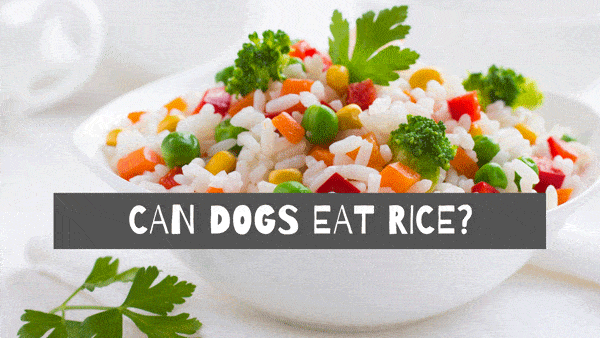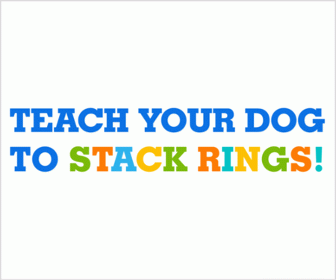Rice is one of the most popular human delicacies all over the world.
Rice is not only yummy and tasty, but it also boasts a high nutritional profile. Not to mention, it’s one of the foods that can be paired with just about any dish, ranging from chicken to beef, veggies, etc. Some people even prefer it as a standalone meal.
Now, if you’re a dog owner, you may be wondering if your pooch can also benefit from the delectable taste and dense nutritional profile of rice. You may constantly be asking yourself, can dogs eat rice?
The answer is a resounding YES. Dogs can eat rice, and there are no immediate health concerns to worry about. Your dog can benefit in various ways from eating rice. Most notably, rice helps to ease constipation and other gastrointestinal issues.
If you didn’t already know it, rice happens to be one of the top components of commercial dog foods, which speaks to its safety and potential health benefits for your canine friend.
So, is rice good for dogs and if it is, can I feed my dog rice then?
Rice is absolutely great for dogs and you shouldn’t have any doubts about incorporating it into your dog’s diet. However, when it comes to feeding people foods to dogs, there are always some caveats. And that’s particularly if the human food in question is plant-based.
Remember that your pooch is a carnivore and doesn’t rely on plant-based foods to thrive. Which means that you should only offer rice to your dog occasionally and keep the portions low.
Read on as we unpack the topic of rice for dogs.
Can My Dog Eat Rice? A Look at the Benefits
Is rice ok for dogs? Rice is perfectly okay for dogs and incorporating it into your dog’s regular diet is a wise decision. But before feeding dog rice, you need to understand the benefits that your canine friend can enjoy from the food.
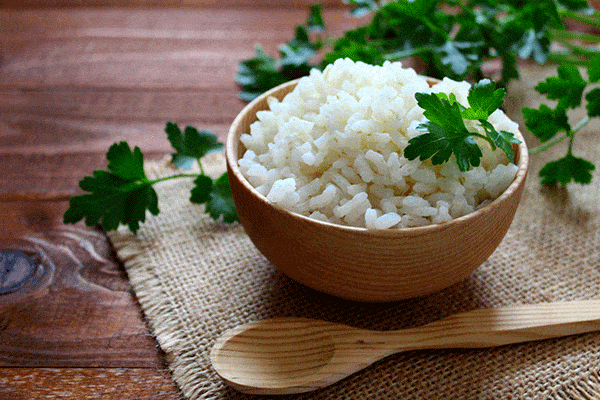
The following are the top health and nutritional benefits of rice for dogs;
1. Helps Relieve Gastrointestinal Distress
As we already indicated, the greatest health benefit of rice for dogs is easing gastrointestinal distress.
Rice has been proven to help relieve constipation, upset stomach, and diarrhea in dogs, thanks to its high abundance in starch and dietary fiber.
Perhaps you’ve always been wondering, can dogs eat rice for diarrhea? And what of upset stomach, can dogs eat rice for an upset stomach?
The answer to both questions is yes. Rice can help to treat diarrhea, upset stomach, and many other gastrointestinal issues in your pooch.
If your dog is struggling with diarrhea and you suspect it’s not due to a serious illness, all you need to do is give it rice for a couple of days.
Served plain and with no harmful ingredients, rice can relieve diarrhea in your dog in as little as 2 – 3 days.
In addition to relieving constipation and diarrhea, the dietary fiber and starch in rice also help to bulk your dog’s stool. As a result, it contributes to regular bowel movements.
Fiber and starch also play a crucial role in nourishing your dog’s gut-friendly bacteria. These are bacteria that reside in the dog’s gut, which help to promote digestion.
What’s more – fiber-rich foods like rice have been shown to lower the risks of cardiovascular diseases by replacing “bad” cholesterol with “good” cholesterol.
2. Boosts Your Dog’s Energy
Another health benefit of rice for dogs is that rice is a good source of carbohydrates.
Carbohydrates provide your canine friend with the energy it requires to play and perform its routine physical and physiological functions.
Although dogs rely on animal protein and fats as their main energy substrate, carbohydrates also play a crucial role in boosting their energy.
- Limited Ingredient Diet Formula: 65 percent of each recipe is from only one animal source for diet-sensitive or choosy dogs
- Grain-Free and High-Protein: High in protein and full of key nutrients with fresh or raw animal ingredients, whole vegetables, fruits, and botanicals
- Made in the USA: Formulated in our Kitchen using only ingredients from trusted sources
Last update on 2024-12-19 / Affiliate links / Images from Amazon Product Advertising API
3. Free From Harmful Fats, Sodium, and Cholesterol
Rice also happens to contain no harmful fats, sodium, or cholesterol. The absence of harmful fats means that your dog can snack on this food without worrying about racking up more pounds.
But how does the absence of sodium in rice positively impact your dog’s health?
Now, it’s worth noting that high sodium levels lead to sodium ion poisoning, a condition that manifests in gastrointestinal distress and seizures. If not addressed with the urgency it deserves, sodium ion poisoning could kill your dog.
Finally, the fact that rice lacks cholesterol means that the food won’t expose your dog to the risks of heart and cardiovascular diseases.
ALSO READ: Can Dogs Eat Chia Seeds and How Safe Are They?
4. Contains Other Powerful Minerals and Vitamins
Rice boasts plenty of other minerals that perform various functions in your dog’s body.
Some of these minerals include;
✔ Calcium,
✔ Iron,
✔ Niacin,
✔ Riboflavin,
✔ Thiamine, and
✔ Vitamin D
Evidently, there are numerous benefits of adding rice to dog food. However, as you shall find, rice comes in various shapes and forms.
Knowing which rice is best for your dog is important if your canine friend is to enjoy all the health and dietary benefits of rice that we’ve highlighted above.
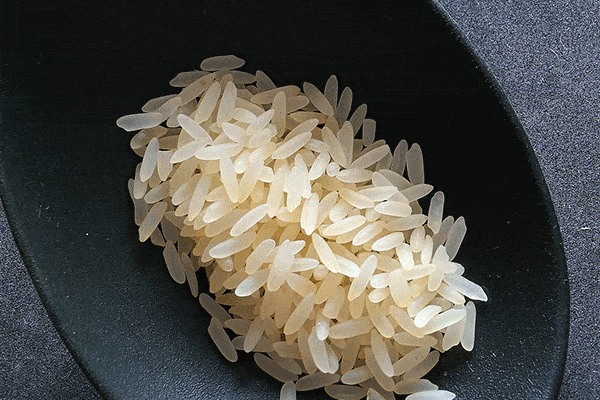
What Is the Best Rice to Feed Dogs?
As we already indicated, rice comes in various shapes and forms.
The two most common types of rice include brown rice and white rice. We shall explore each type and examine if and when it’s ideal for your pooch.
Can Dogs Eat Brown Rice And When Is It Ideal?
Brown rice refers to the entire whole rice grain. As you may expect, it boasts the fiber-rich bran and the carbohydrate-rich endosperm, among other healthy minerals. And yes, dogs can eat brown rice. So, can dogs eat whole grain rice?
Since brown rice is essentially the entire whole rice grain, the answer to that question is yes, dogs can eat whole grain rice.
Your next concern should be how your dog will benefit from eating brown rice.
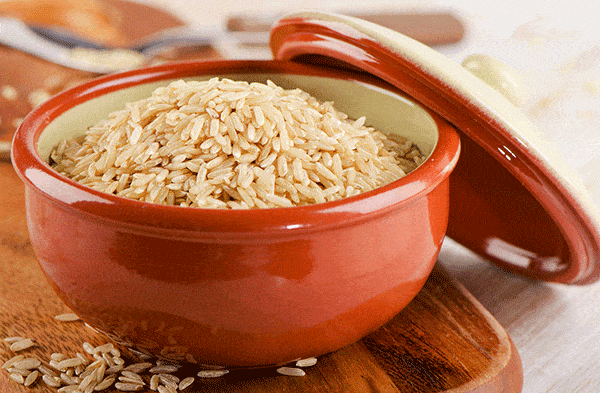
Now, before we delve into the health and dietary benefits of brown rice for dogs, the following are key points about brown rice that you should always remember;
✔ Brown rice is rich in fiber and carbohydrates – While carbohydrates can help to boost your dog’s energy, too much of it can be detrimental to the animal. That’s because animal protein and fats are the two main energy substrates for dogs, and their digestive system doesn’t process carbs so well.
✔ Brown rice isn’t an ideal source of fat and protein.
✔ Brown rice is low in sodium and cholesterol.
✔ Brown rice is beneficial to dogs only in small portions – While the high fiber content in brown rice can help to relieve GI distress, too much of it can cause a laxative effect.
In terms of nutritional profile, a ½ cup serving of brown rice contains 1 gram of fat, 6 grams of protein, and 23 grams of carbs.
In addition to these three components, brown rice also comes with plenty of other minerals and vitamins, including;
✔ Folic acid,
✔ Magnesium,
✔ Manganese,
✔ Niacin,
✔ Phosphorus,
✔ Potassium,
✔ Riboflavin,
✔ Sodium,
✔ Thiamin, and
✔ Vitamin B-6
- Contains one (1) 24-pound bag of Nature′s Recipe grain free dry dog food
- Number-one ingredient is real salmon, a quality protein source that helps maintain optimal muscle strength
- Fiber from sweet potatoes and pumpkin helps support digestion and immune system health
Last update on 2024-12-26 / Affiliate links / Images from Amazon Product Advertising API
So, can I feed my dog brown rice and when is it ideal?
Generally, you should give your dog brown rice if;
✔ The rice is all-natural, less refined, and less processed.
✔ Your dog is suffering from skin allergies and other skin conditions.
✔ The dog has a poor appetite.
✔ The dog has a high blood pressure.
✔ The dog is diabetic.
✔ You’re looking to soothe the dog’s sensitive stomach and improve digestion.
✔ You’re seeking to boost your dog’s overall immunity and keep conditions like cancer and Alzheimer’s disease at bay.
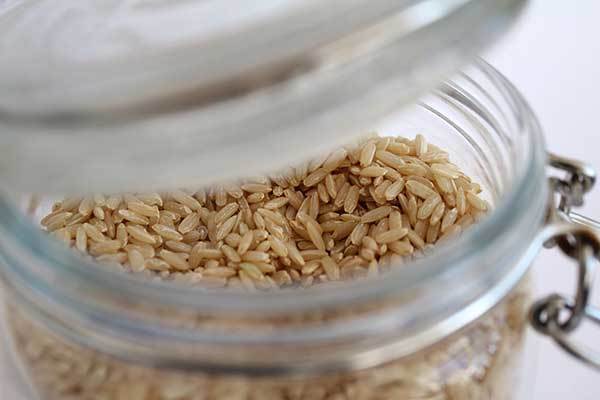
On the same breath, avoid brown rice if your dog has diarrhea. Brown rice is rich in fiber, and fiber-rich diets are known to loosen stool, further exacerbating diarrhea. So, can dogs eat brown rice when sick?
Well, it depends on the sickness. The two most common gastrointestinal issues include constipation and diarrhea. And as we’ve already indicated, brown rice is excellent for constipation but not ideal for diarrhea.
Which implies that all digestive issues that are symptomized by diarrhea, such as Irritable Bowel Syndrome (IBS) and Irritable Bowel Disease (IBD), shouldn’t be treated using brown rice. Therefore, can dogs with IBS eat rice? And what of IBD, can dogs with IBD eat rice?
If the rice in question is brown, then avoid feeding it to a dog with IBD or IBS. You’re better off with the low-fiber white rice instead.
- ???? ORIGINAL PROBIOTICS FOR PETS SINCE 2008: Boasting 360 scoops (that’s an impressive 360 Billion CFU per jar), our Probiotic Miracle supplement…
- ???? AMERICA’S #1 TRUSTED PET PROBIOTIC: Combat dog diarrhea, yeast overgrowth, loose stool, bad breath, constipation, itching & scratching,…
- ???? ENDORSED BY VETERINARIANS: No rice, no maltodextrin. Our vegetarian, gluten-free, grain-free formula contains zero dairy, soy, fillers,…
Last update on 2024-12-23 / Affiliate links / Images from Amazon Product Advertising API
Can Dogs Eat White Rice And When Is It Ideal?
White rice is essentially brown rice that’s stripped of the germ and bran, leaving behind only the endosperm.
After the germ and bran have been removed, white rice is then processed to enhance its taste, improve its cooking properties, and extend its shelf life.
One of the main benefits of white rice for dogs is that it’s easy to digest. Most dog owners often wonder, can dogs digest rice?
Yes, dogs can easily digest rice, but their digestive system is more effective for white rice. And that also begs the question – can dogs digest brown rice?
Dogs can also digest brown rice. However, the digestive system of dogs doesn’t process brown rice as effectively as it processes white rice.
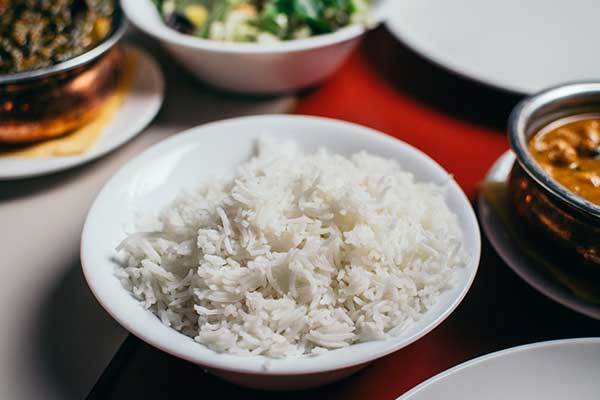
The following are the top benefits of unrefined white rice for dogs;
✔ Low in fat and sodium,
✔ High in energy and rich in Vitamin D,
✔ Improves digestion and bowel movements,
✔ Cures stomach ailments, and
✔ Great source of calcium, iron, niacin, riboflavin, and thiamine.
ALSO READ: Can Dogs Eat Hot Dogs? What Do Experts Think?
Which Is Better For Dogs? White or Brown Rice?
Before we compare their differences, it’s worth noting that both white and brown rice are gluten-free. That makes them an excellent dietary remedy for dogs with celiac disease or other forms of gluten sensitivity.
In terms of their differences;
1. Brown rice is more nutritious
As brown rice is the entire whole grain, it boasts a higher nutritional profile than white rice which usually has the bran and germ removed.
However, note that some manufacturers often enrich white rice with more minerals and vitamins. Therefore, when it comes to commercially-prepared rice, the most important thing is the ingredients used.
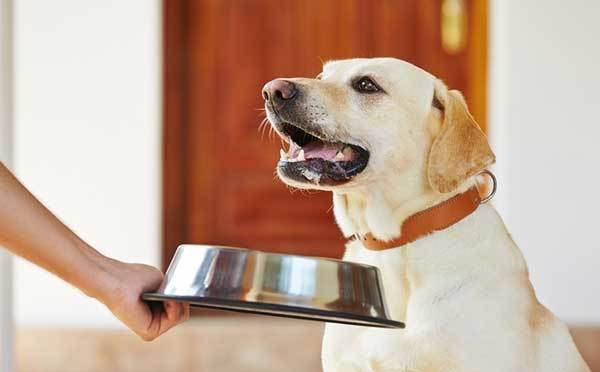
2. Brown rice is great for constipation
Brown rice is rich in dietary fiber, which makes it ideal for constipated dogs.
3. White rice is great for diarrhea
The fact that white rice contains moderate fiber makes it an effective remedy for diarrhea and stomach conditions that are symptomized by diarrhea, such as IBS and IBD.
4. White rice is cost-effective
White rice is cheaper than brown rice, which explains why it’s the most common rice type available. Also, white rice is easier to prepare for your dog.
5. Brown rice packs more antioxidants
In terms of boosting your dog’s immunity, you’re better off with brown rice. Brown rice particularly boasts a lower glycemic index, which makes it ideal for diabetic dogs.
Overall, unprocessed brown rice is better than unprocessed white rice. After processing and refining, you can never really know which rice type is more beneficial unless you check out the ingredients list. But if you’re ever in doubt as to which rice is better for your pooch, your best bet is to settle for brown rice.
What Is The Best Way To Prepare Rice For Dogs?
Now that we’ve already established that rice is great for dogs, you may be wondering whether you can offer rice to your dog raw or cooked.
But can dogs eat uncooked rice?
No, nutritionally-speaking, your dog will not really benefit from uncooked rice. Plus, uncooked rice is tasteless and can lead to choking hazards.
So, can dogs eat cooked rice then?
Yes, you’re better off serving your canine friend cooked as opposed to uncooked rice. However, you should also remember that there are various methods of preparing rice, and only a few of those are recommended when it comes to rice for dogs.
You could be wondering, can dogs eat boiled rice? And what of fried rice, can dogs eat fried rice?
Fried rice is discouraged for dogs since it contains processed fats, salt, and other ingredients that are considered toxic to dogs.
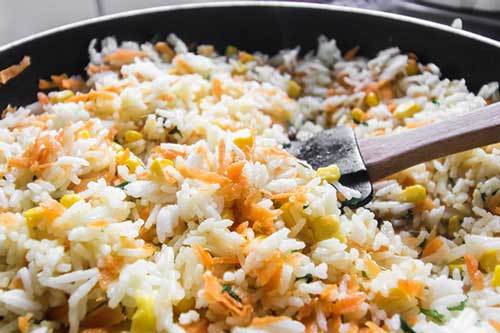
The best way to prepare rice for dogs is to boil the rice in plain water, without adding salt, fats, spices, or seasoning. If the rice commercially-prepared, read the ingredients list first before you buy it.
Ensure that the rice is free from harmful additives and preservatives, such as sodium, nitrates, onions, and garlic. When ready, serve the rice to your dog either as a standalone meal or mix it into the dog’s regular food.
One of the best things about cooking rice for dogs is that there are plenty of rice-based dishes you can experiment with. Speaking of which, can dogs eat rice and tuna?
Yes, dogs love seafood, and rice and tuna is an excellent pair.
Also, can dogs eat eggs and rice?
It’s not unusual to come across dog owners wondering to themselves, can I feed my dog eggs and rice?
Egg is also a perfect dog food, so you can safely serve your pooch eggs and rice.
- Works as a dog food topper – For pet parents looking for an alternative to capsules, raw treats, or soft chews, all it takes is a few pumps of Salmon…
- A tasty & body nourishing treat for cats & dogs – Essential fatty acids for a healthy coat.
- Powerful Omega Fatty Acids – This premium fish oil liquid formula is loaded with the healthy Omega-3 fatty acid (with epa and dha) to support health…
Last update on 2025-01-15 / Affiliate links / Images from Amazon Product Advertising API
And what of chicken and rice, is chicken and rice for sick dogs recommended?
You may be a loving dog owner wondering, can I feed my dog chicken and rice every day?
Chicken is another excellent food that you can pair with rice for dogs.
Chicken and rice is especially perfect for a sick dog that has lost its appetite. However, you shouldn’t feed chicken and rice to your dog every day, as dogs shouldn’t eat rice every day. Two to three times a week is recommended.
And that also brings us to the questions, how much rice can I give my dog and can I feed my dog rice every day?
By virtue of being a plant-based food, you shouldn’t feed rice to your dog every day. Experts recommend giving dogs rice a maximum of three times a week. Most importantly, monitor the portions depending on the size and age of the dog.

Other Frequently Asked Questions About Dogs and Rice
Can dogs eat instant rice?
Instant rice refers to precooked rice. However, it’s usually cooked for between 1 and 7 minutes, as opposed to regular rice that requires up to 30 minutes of cooking. So, instant rice is not great for dogs.
Can dogs eat microwave rice?
Just like instant rice, microwave rice is not very soft for dogs to eat.
Can dogs eat risotto rice?
Risotto rice features the high-starch Italian short-grain rice and it’s perfectly safe for dogs to eat.
Can dogs eat sushi rice?
Sushi rice is made of Japanese short-grain rice and is also okay for dogs to eat.
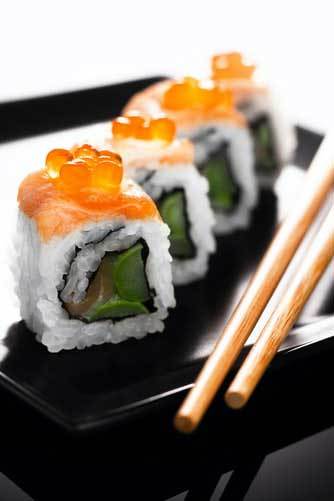
Can dogs eat Daal rice?
Yes, Daal rice is perfectly fine for dogs too.
Can dogs eat wild rice?
Yes, there shouldn’t be a problem offering wild rice to your dog.
Can dogs eat yogurt and rice?
The probiotics in yogurt help to nourish your dog’s gut. So, yoghurt and rice is a great pair for dogs.
Can dogs eat rice pudding?
Yes, but you’ll need to ensure the pudding contains only ingredients that dogs should eat.
Can dogs eat rice crackers?
Since rice crackers are low in sugar and fats, they’re healthy and beneficial for dogs.
Can dogs eat Korean rice?
The Korean multigrain rice comes with a cocktail of benefits since it also includes other healthy ingredients like millet, sorghum, chickpeas, etc.
Can dogs eat black rice?
Much like brown rice, black rice doesn’t undergo refining or processing. That ensures it retains all its nutritional elements, making it excellent for dogs.
Can dogs eat rice Krispies?
Yes, rice Krispies are free from harmful chemicals and additives, making them a welcome addition to your dog’s diet.
Can dogs eat rice cakes?
Yes, just be on the lookout for toxic sweeteners.

Can dogs eat jasmine rice?
Jasmine rice is moderately okay for dogs.
Can dogs eat basmati rice?
Just like Jasmine rice, Basmati rice is safe for dogs in moderation.
Can dogs eat butter and rice?
Butter may cause lactose-intolerance in dogs. Plus, there are risks of weight gain. Therefore, butter and rice isn’t an ideal pair for dogs.
Can dogs eat rice flour?
If the flour isn’t laced with any harmful ingredients, then you can offer it to your dog. However, you must cook rice flour before offering it to your dog.
Can dogs eat red rice?
Red rice owes its red color to its high abundance in anthocyanins, which makes it highly nutritious for dogs.
Can puppies eat rice?
If you just acquired a pup, you might be wondering, can I feed my puppy rice?
Generally, puppies can eat rice but can puppies eat brown rice? While puppies can eat both brown and white rice, they’re better off with the more digestible white rice.
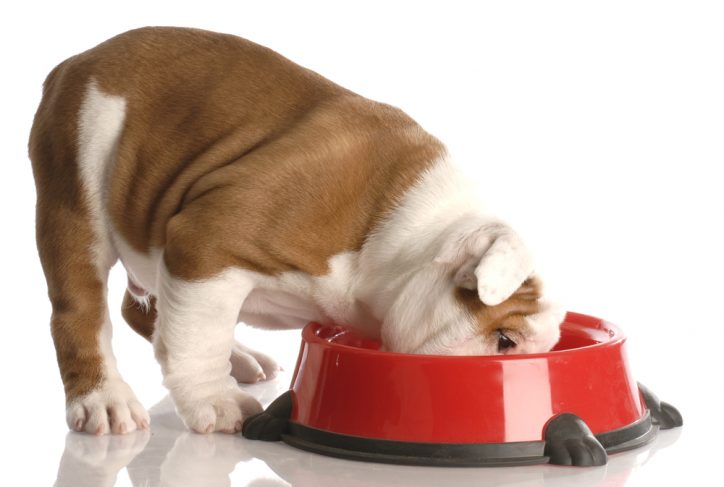
Conclusion
So, can dogs eat rice safely?
Yes, dogs can eat rice safely. However, like most plant-based foods, rice is only ideal for dogs in small amounts.
Checkout Our Favorite Dog Products
1. BEST FOOD FOR DOGS AND PUPPIES
We Like: Victor Super Premium Pet Food – Ideal for growing puppies and pregnant or lactating females. Also provides sustained energy for sporting dogs and dogs with high physical demands.
2. BEST DOG TRAINING PROGRAM
We Like: Doggy Dan The Online Dog Trainer – Stop any dog problem and raise the perfect puppy with The Online Dog Trainer.
3. BEST DOG DNA TEST
We Like: Embark Dog DNA Test – Embark screens for over 250 dog breeds + tests for 170+ genetic diseases including MDR1 drug sensitivity, glaucoma, degenerative myelopathy, and dilated cardiomyopathy, some of the most common adult-onset diseases in dogs.
4. Best Vacuum to Tackle Pet Hair
We Like: ORFELD Cordless Vacuum – Engineered for homes with pets. With features and tools that dig out dirt, hair and allergens everywhere your pet gets.

